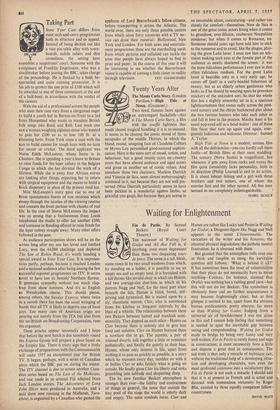Taking Part .
State Your Case differs from most cash-and-carry programmes both in structure and in appeal. Instead of being decked out like a vast pin-table alley with score- N 0 boards, nubile ushers and dire comedians, the setting here resembles a magistrates' court. Someone with the composure of Franklin Engelmann, who was a stockbroker before joining the BBC, takes charge of the proceedings. He is flanked by a bald, be- spectacled and quite cunning prosecutor. It is his job to protect the one prize of £100 which will be awarded to one of three contestants at the end of a half-hour, in accordance with the verdict of the viewers.
With the aid of a professional actress the people who state their case vary from a clergyman eager to build a youth but in Burton-on-Trent to a lad from Hampstead who wants to translate British folk songs into Rock and Roll. Last week one saw a woman weighing eighteen stone who wanted to gain her £100 so as to lose 100 lb. at a slimming farm. From York came a man with the aim to build canoes for tough boys with no taste for soccer or cricket. The third applicant was Nurse Edith McLennon, whose home is in Cheshire. She is spending a year's leave in Britain to raise funds for the leper colony in the Belgian Congo to which she has devoted the work of a lifetime. While she is away four African nurses are looking after things, expecting her to return with surgical equipment and the means to build a brick dispensary in place of the present mud hut.
Miss McLennon's story gave rise to one of those spontaneous bursts of raw emotion which sweep through the niceties of the viewing routine and connect the front parlour with chunks of real life. In the case of Nurse McLennon the impact was so strong that a businessman from Leeds telephoned the studio to offer her another £100, and someone in Reading offered to raise funds for the leper colony straight away. Many other offers followed in the post.
As audience participation shows will be on the screen long after my son has loved and loathed Lucy, won the 64,000 challenge and deplored The Son of Robin Hood, it's worth handing a special award to State Your Case. It is unpreten- tious partly, perhaps, because it reached London and a national audience after being among the few successful regional programmes on ITV. It seems pever to have lost its homely Northern flavour. It generates sympathy without too much clap- trap from show business. And it's as English as Wensleydale cheese. This should please, among others, the Sunday Express, where twice in a month there has been the usual wringing of hands that all TV is likely to deprive one of local joys. Too many cans of American origin are pouring not merely from the ITA but also from the un-British un-Broadcasting Corporation, runs the argument.
These articles appear seasonally and I hope that before the next batch is due somebody round the Express Group will prepare a piece based on the Empire line. There is every sign that a lively exchange of programmes with the Commonwealth will make 1957 an exceptional year for British TV. It began, perhaps, with a series of Canadian plays which the BBC put on during the winter. The ITV channel is due to screen another Cana- dian series based on The Last of the Mohicans, and one made in or around Fiji adapted from Jack London stories. The Adventures of Long John Silver were produced in Australia, and a quiz show now running in the Midlands, Turn- about, is organised by a Canadian who gained the
applause of Lord Beaverbrook's fellow-citizens, before transporting it across the Atlantic. The world over, there are only three possible centres from which some forty countries with a TV ser- vice can draw their material : Hollywood, New York and London. For both news and entertain- ment programmes these are the marshalling yards from which pictures and celluloid can tackle the aims that people have always hoped to find in print and paper. In the course of this year it will be interesting to see whether the Beaverbrook vision is capable of coming a little closer to reality












































 Previous page
Previous page